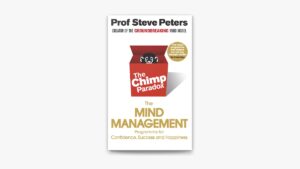Last week we gathered our clients together for our quarterly meeting where we focus on producing clear 90 Day Plans. Part of these meetings always includes some education and this quarter we looked at the role our mindset plays in our business success and in they way we communicate.
Whether you’re making tough decisions, handling setbacks, or leading a team, your ability to manage your thoughts and emotions can make all the difference. That’s why we took clients through the learnings from Professor Steve Peters’ book, “The Chimp Paradox”.
This book breaks down the complexities of how our brains work, helping us understand why we sometimes react emotionally rather than logically—and, more importantly, how we can take control. This blog will explore some of the lessons from the book and how to apply them in your business.
Understanding Your Inner Chimp
At the heart of “The Chimp Paradox” is the idea that our brain has three key components:
- The Chimp (Emotional Brain) – This is the impulsive, emotional, and instinct-driven part of your brain. It’s responsible for fear, frustration, self-doubt, and knee-jerk reactions.
- The Human (Logical Brain) – This is the rational, strategic part of your brain that thinks logically, plans for the future, and makes well-reasoned decisions.
- The Computer (Automatic Responses) – This part stores habits, learned behaviours, and beliefs that influence both your Chimp and your Human.
In business, your Chimp might show up when you get negative feedback, experience rejection, or face uncertainty. It’s the part of you that reacts emotionally before thinking things through. If left unchecked, it can lead to poor decisions, unnecessary stress, and even self-sabotage.
How to Manage Your Chimp in Business
The key to success isn’t about eliminating the Chimp—it’s about managing it effectively. Here’s how:
Recognise When Your Chimp is in Control
The first step is awareness. When you feel emotional—whether it’s anger, fear, or frustration—pause and ask yourself: “Is this my Chimp reacting, or is this a logical response?”
For example, if a client cancels a big contract, your Chimp might panic, assume the worst, or lash out. Your Human, however, would analyse the situation calmly, assess next steps, and look for new opportunities.
Let Your Chimp Express Itself—But on Your Terms
Professor Peters explains that trying to suppress your Chimp doesn’t work—it will only get louder. Instead, let it express itself in a controlled way.
If you’re frustrated about a business situation, write down everything you’re feeling, but don’t act on it immediately. Give yourself time before responding. This prevents emotional decision-making. I’m sure at some point we’ve all said to ourselves “count to 10 before you respond”. This is just another way of letting our chimp settle before we let it out!
Reprogram Your Computer with Positive Habits
Your Computer stores beliefs and habits that either support or hinder your success. If your Computer is filled with negative beliefs (e.g., “I’m terrible at sales” or “I’ll never be successful”), your Chimp will feed off them.
Actively work on your mindset by reinforcing positive habits and beliefs. Create affirmations, visualise success, and surround yourself with positive influences. Over time, this will retrain your automatic responses.
Prepare for High-Pressure Situations
Business often involves high-stakes decisions. When under pressure, your Chimp may take over, leading to rash choices.
Before a big meeting or decision, rehearse the situation in advance. Think about how your Chimp might react and plan how your Human will take control. This reduces emotional responses and improves decision-making.
Applying The Chimp Paradox to Leadership & Growth
A strong mindset isn’t just about personal success—it’s also key to leading a team and growing a business. Here’s how you can apply these principles to leadership:
- Help your team manage their Chimps. If an employee reacts emotionally to feedback or change, don’t engage in their Chimp’s battle. Stay calm and encourage rational thinking.
- Use logic in negotiations and problem-solving. Before reacting emotionally in a business deal, take a step back and let your Human assess the situation.
- Create a culture of rational decision-making. Encourage your team to focus on facts, not emotions, when facing challenges.
Your Chimp will always be part of you—but it doesn’t have to control you. By understanding how your mind works, you can manage your emotions, make better decisions, and ultimately run your business with more confidence and clarity.
So next time you find yourself reacting emotionally to a challenge in business, take a step back. Ask yourself: “Is this my Chimp talking?” If so, pause, reset, and let your Human take the lead.
By applying the principles from “The Chimp Paradox”, you’ll not only become a stronger business owner—you’ll also develop a mindset that sets you up for long-term success.






